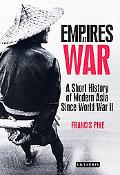

 |

|

The average rating for Empires at War: A Short History of Modern Asia Since World War II based on 2 reviews is 4 stars.
Review # 1 was written on 2020-07-26 00:00:00 Joe Gordon Joe GordonI wish I could have this book on loan indefinitely! Yes, it was a long read (about 700 pages) but it was such an enjoyable and nourishing one. The only problems I had with the book was that there were a few factual inaccuracies (not sure if they were accidental) -- Goh Keng Swee never served as Prime Minister of Singapore (mixed him up with Goh Chok Tong maybe?). But really those errors were few and far between. I appreciated this book first and foremost for its immense scope. Pike really delved into almost every country in Asia, from Sri Lanka to Japan, North Korea to Indonesia. Maybe it's my relative lack of knowledge in this field but Pike's writing was also incredibly insightful; like a surgeon, he makes precise incisions into the history of each country, making it as straightforward as possible for the reader. A few things that stood out to me: 1) When given the choice, more North Vietnamese moved to South Vietnam than vice versa. Same in East Germany. If that's true, it really challenges the way I understand the Vietnam War, as well as the way the war is taught in school. Might the curriculum/the prevailing school of thought be over-emphasising the nature of the war as a civil war? After all, the North Vietnamese received military aid from the Soviets and the Chinese. Additionally, North Vietnam also engaged in illegal activities in Laos and Cambodia, not dissimilar to what the USA did in Cambodia. 2) The student uprising in Beijing in 1989 might have stymied democratisation in China! According to Pike (and Ronald Reagan), there were elements in the Chinese government (Zhao Ziyang for example) who were for political liberalisation but who were ousted following the Tiananmen Square massacre. Is there still hope for democratisation in China? Who knows. 3) The writer's argument that the surface-level extreme instability of Thai politics actually disguised a generally stable social and political order. This was definitely something unexpected as it went against the argument I had been exposed to in school. Is Thailand really that stable? Certainly the political order is stable in the sense that coups have become a mainstay in Thai politics and the people are generally not taken aback when they happen; coups also reflect the contestation of power within the military which holds a decent amount of political power. However, the Thai people have been demanding more democracy in recent years (re: pro-democracy uprisings after the military takeover in 2014). Rule by a military junta is increasingly delegitimised. The predominance of the military in Thai politics and its reluctance to cede power to civilian politicians is definitely a symptom of political instability. The predictability of coups in Thailand does not negate instability as much as the predictability of military conflict in the Middle East does not mean stability in the region. 4) Pike does not really explore the flaws of the Reagan-Thatcher era. Being one of the most vilified politicians in recent years, it comes as a surprise that Pike simply portrays Thatcher as a like-minded ally of Reagan's whose ideology and policies contributed to a resurgence of Anglo-Saxon confidence and Soviet defeat. Were they simply heroes? 5) The BRILLIANT analysis and evaluation of the successive administrations of Kennedy, Johnson, and Nixon in dealing with the Vietnam War. Certainly if a war is to be fought, it should be fought well. Of course, it doesn't help that the American electorate is incredibly capricious and often the most scathing critic of the American government. 6) The hypothetical scenario presented of the USSR being the sole nuclear power after WWII. Would we be living in such a free world still? While the American 'empire' is deserving of criticism for its sometimes self-interested and unilateral policies, credit should also be given where it is due. Reading this book was like eating sour candy (stream Chromatica!). On the outside, the book is wrapped with a neat Cold War narrative featuring the rise of Asia towards the end; on the inside, Pike unravels the histories of individual Asian countries. Final thoughts: Are we better off in a multipolar world, a bipolar world, or a unipolar world? Will we see the re-emergence of a Cold War between the US and China? Will it be worse than that between the US and the USSR? If only the study of history provided answers. Like palmistry, but tried and tested. |
Review # 2 was written on 2011-08-07 00:00:00 Lem DuBose Lem DuBoseA whistlestop - and up-to-date - tour of colonialism and independence throughout the region, focussing on British, French and Japanese imperialism and with a lot both on India and China. As much a reference work as a traditional narrative history. Highly readable and recommended for beginners and experts alike, combining a history, political analysis and wider context in one large volume devoid of technical languag, thisis a truly excellent work. |
CAN'T FIND WHAT YOU'RE LOOKING FOR? CLICK HERE!!!